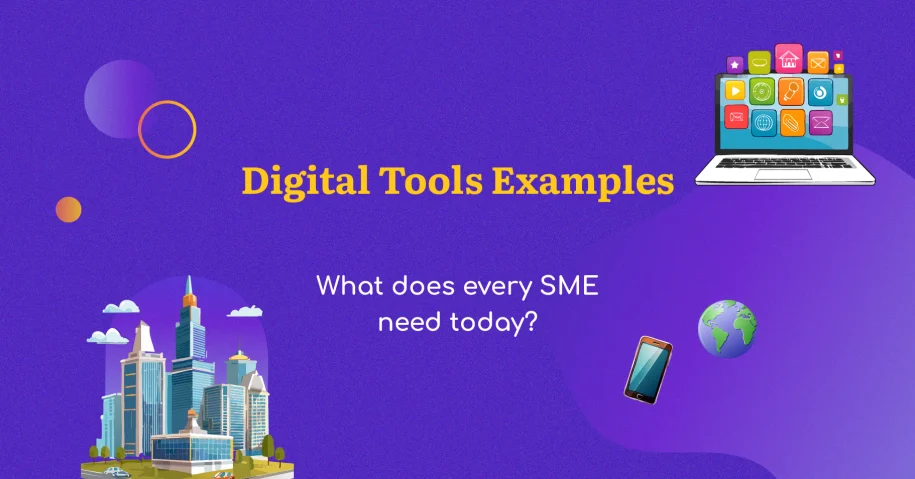In the modern world, the transition to digital tools is not a luxury, but a necessity. SMEs are now called upon to adapt to a constantly evolving digital environment in order to remain competitive and sustainable.
Digital transformation comes to reshape the way modern services operate, communicate and provide services with innovative solutions, offering automation and efficiency.
Together, we will explore some digital tools examples that are essential for every SME that wants to remain active in the market.
In this article we will see:
Digital tools examples that every modern business needs
Organization and management tools
Digital tools for organizing and managing a company’s services or resources are the heart of business operations. Solutions for automating project management, human resources and assets is essential for the smooth operation and organization of a business.
The most important digital tools examples in this sector are:
ERP (Enterprise Resource Planning): ERP systems bring together all the functions of a business on a single platform: pricing, human resources, procurement, sales, production, marketing, etc. They are the control center of the modern business and offer customization capabilities according to the specialized needs of each organization. The most popular ERP solution is SoftOne.
Task management tools: Organizing daily tasks and monitoring the progress of the team is now more efficient with digital tools such as Microsoft Planner. With this tool, businesses can assign tasks to employees, control the progress of their work and be informed about the efficiency of the team.
Digital invoicing: Digital invoicing is now mandatory, while also providing an opportunity for better financial monitoring. For more mature or growing businesses that have adopted the Microsoft ecosystem, Dynamics 365 Finance offers extensive capabilities for automating accounting, budgeting, cash flow and forecasting. It also allows businesses to have a complete view of their finances in real time, reduce operating costs and identify opportunities for improvement.
Customer and sales management tools
Customer experience largely determines the success of a business. From the first contact to after-sales service, there are some basic digital tools examples that can lay the foundation for developing the right customer relationships.
CRM: CRM (Customer Relationship Management) is the most effective tool for recording the needs, preferences and history of your customers. CRM allows sales teams to manage leads, the sales cycle, automate reminders and monitor customer behavior. It is an essential digital tool for any small or large business as it is the core of customer relationships!
Applications for sales and offers automation: By using tools like Microsoft Power Automate, organizations can replace manual offers with the automatic creation and signing of contracts. Automating the processes related to contracts saves valuable time from employees and enhances the professional profile of the business.
Communication and collaboration tools
Effective communication and collaboration between team members or between different teams are essential for modern SMEs. Let’s see the digital tools examples that help in faster customer service and enhance productivity.
Communication apps and live chat: Tools like Microsoft Teams enhance an organization’s internal communication, making collaboration more flexible and direct compared to classic emails. These communication channels also support file sharing, participation in online meetings and creation of group chats. Microsoft Teams in particular offers expanded possibilities for businesses that use the Microsoft ecosystem, as it can be connected to Outlook, SharePoint, Planner and OneDrive.
File sharing platforms: Sending files via email is now a thing of the past – cloud is the most secure and reliable place to store documents and collaborate. Cloud storage platforms ensure that an organization’s documents and data are accessible to employees at any time and from anywhere. Tools like OneDrive and SharePoint allow teams to create a common data storage point and work on the same files simultaneously, enhancing transparency and speed of work.
Digital marketing tools
A business’s online presence is not enough on its own. SMEs need the right tools to reach their audience and convert traffic into sales. Digital marketing becomes more efficient when there are the right digital tools to enhance these goals.
Social media management: Social media management is a complex process that does not stop at publishing posts and creating content. Platforms such as Meta Business Suite allow you to monitor interaction with the audience, analyze performance and display statistics in order to make the right decisions and design the most suitable strategy. In addition, they provide the ability to create social media campaigns to promote the business to a wider audience, strengthening the brand’s profile and boosting sales.
Email marketing: Email remains a powerful communication channel, but only if it is used correctly and in a targeted way. Tools like Mailchimp support the sending of newsletters, automated emails (such as purchase confirmations), and personalized offers. They also offer insights that help businesses understand what their audience likes, and personalization capabilities to add value to each customer.
Ads and campaigns: A platform like Google Ads is essential for online advertising and campaign creation. This digital tool supports the creation of campaigns by targeting specific keywords and strategically planning and displaying ads. It also offers analytical data and automated reports on ad performance, so that the business can optimize its strategy.
SEO tools: SEO is the flagship of digital marketing. SEO is what will define the success of a website and its ranking in search results. Digital SEO tools bring together all the necessary functions to organize a content optimization strategy: competition research, search for suitable keywords, monitoring the health and ranking of the site, content suggestions and analytical reports. Platforms like Ahrefs or Semrush are essential for identifying problems and optimizing a website that wants to remain competitive in the digital world.
Benefits of digital transformation
The adoption of advanced digital tools by an organization is primarily a strategic choice that affects all areas of its operation. From the organization of daily operations to future growth, digital transformation mainly offers the following benefits:
Increased efficiency
By automating repetitive tasks – such as invoicing, inventory tracking or expense recording – employees can focus on more essential tasks. As a result, efficiency increases, without increasing the operating costs of the company.
Better decision-making
Access to reliable data in real time is perhaps one of the greatest advantages of digital tools. A clear picture of the sales cycle, expenses and market trends can help make informed decisions.
Customer service optimization
Modern tools offer the ability to record customers’ consumption habits, history and preferences. This allows businesses to communicate in a targeted way, suggesting products that are truly of interest to the customer, but also to upgrade the customer service process. In this way, happy and loyal customers are created.
Competitive advantage
Businesses that adopt the right digital tools early have the ability to respond more quickly to market changes, by testing new services. In a highly competitive and rapidly evolving market, speed and adaptability often determine who survives and who is left behind.
Cost savings
Technology is not always expensive – on the contrary, many digital solutions are offered with flexible packages or payment models. Especially the adoption of cloud systems is a more budget-friendly option compared to setting up and maintaining on-premise systems. In addition, modern digital tools allow for better management of employees’ time, allowing them to focus on more profitable areas for the business.
Flexible work environment
After the pandemic, flexible work models have been explored more than ever. Remote work and hybrid model are here to stay, as they offer employees the ability to be equally productive and easily collaborate with their team from anywhere in the world. New communication and connectivity tools have set a strong foundation for the development of the modern business environment.
What does NUS Solutions offer?
NUS Solutions, with experience and expertise in creating digital products for businesses, provides solutions for every specific need of a modern enterprise. As Microsoft partners, we create custom applications so that each business can automate its processes, offer a unique customer experience and increase its sales.
At the same time, we have a portfolio of applications that offer ready-to-use integrated solutions for different industries. Contact us to analyse your goals and design a solution tailored to your needs!






…